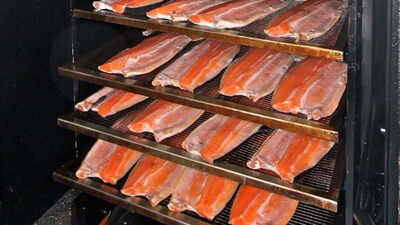ARTICLE AD BOX

Haifa Smoked Fish, a Queens, New York-based smoked fish company, has issued a nationwide recall of certain cold-smoked salmon and sea bass products after health officials detected a potential Listeria monocytogenes contamination.
The recall affects specific lots of 8-ounce packages. Although no illnesses have been officially reported yet, the risk is taken seriously because Listeria infections can be dangerous, especially for young children, the elderly, pregnant women, or anyone with a weakened immune system.
What happened: The recall details
On September 16-17, the US Food and Drug Administration (FDA) published a recall announcement from Haifa Smoked Fish of Jamaica, New York.
The products being recalled are Cold Smoked Salmon, 8 oz, Lot #219, and Cold Smoked Seabass, 8 oz, Lot #212.These are vacuum-packaged items, sealed between paperboard and flexible plastic.The contamination was discovered after sampling by the New York State Department of Agriculture and Markets' Food Inspectors and subsequent analysis by a food laboratory that found Listeria monocytogenes in the products.The recalled products were distributed nationwide through both retail stores and distributors.
The company urges consumers who bought these specific lots to return them to the place of purchase for a full refund. For queries, consumers can reach out to the listed contact number as well (718-523-8899).

What is Listeria and why you should pay attention
Listeria monocytogenes is a bacterium that can cause a serious infection called listeriosis. It is foodborne and can survive and even grow at refrigeration temperatures. A listeria outbreak is a situation where two or more people get sick from eating food contaminated with the bacteria.
This can happen when the food is processed, prepared, or stored in unsanitary conditions. Listeria outbreaks are typically identified when multiple individuals experience similar illnesses after consuming the same potentially contaminated food.Most healthy people might have mild symptoms like fever, headache, stiffness, nausea, abdominal pain, or diarrhea. But in high-risk groups – pregnant women, infants, older adults, and people with weakened immune systems – the infection can be severe: miscarriage, stillbirth, dangerous bloodstream infections, or even death. Proper food handling, including cooking to safe temperatures and avoiding high-risk foods, is crucial to prevent listeriosis. Because smoked fish is often consumed without further cooking (cold smoked), no step kills bacteria after packaging. That makes the contamination more risky.

What consumers should do
Check your packaging: If you have bought Haifa Cold Smoked Salmon (Lot #219) or Haifa Cold Smoked Seabass (Lot #212), 8-oz packages, do not eat them.
Look for the lot number 219 or 212 printed on the package.Return for refund: Take the product back to the store where you purchased it. Retailers and distributors are being asked to accept returns of these lots and give full refunds.Dispose safely if needed: If you can’t return it, discard the product safely. Ensure it’s sealed in a trash bag so others (pets, children) don’t accidentally access it. Clean any surfaces or utensils that it may have touched, using hot soapy water or disinfectant.Watch for symptoms: If you’ve eaten the product and feel sick, especially if you’re in a high-risk group, see a doctor. Mention possible Listeria exposure and symptoms such as fever, muscle aches, gastrointestinal issues, or stiff neck. Early detection and treatment help.Pregnant women and high-risk individuals: Be extra cautious. Listeria is particularly dangerous during pregnancy and for immunocompromised persons. If you’re pregnant and believe you consumed the recalled lot, contact a healthcare provider even if you feel fine.
Covid-19: Here’s how you can take the six minute walk test at home



.png)
.png)
.png)
















 1 hour ago
4
1 hour ago
4









 English (US) ·
English (US) ·